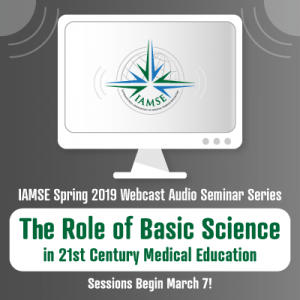
[The following notes were generated by Mark Slivkoff, PhD]
IAMSE Webinar Series, Spring 2019
Speakers: Kim Dahlman, PhD
Assistant Professor of Medicine Co-leader, Integrated Science Courses Vanderbilt University School of Medicine Nashville, TN USA
Title: Role of Foundational Sciences in Clinical Years
Series: The Role of Basic Science in 21st Century Medical Education
During last week’s webinar, we learned of the unique curriculum of Boonshoft School of Medicine at Wright State University. This week’s presentation by Dr. Kim Dahlman also focused on a non-traditional approach to medical education, specifically on the curriculum at her U.S. medical school, the School of Medicine at Vanderbilt University in Nashville, Tennessee. Most medical schools have clear course distinctions between the basic foundational sciences and clinical sciences; first- and second-year students usually spend their time studying the former while “post-board-exam” students in the third and fourth years usually are in clinical rotations and out of the classroom. At Vanderbilt, however, as Dr. Dahlman explained, third and fourth year students are required to take classroom-based courses which are heavily grounded in the foundational sciences.
Dr. Dahlman laid out her agenda for her presentation and subsequently discussed the rationale for foundational science integration, the specifics of the Vanderbilt Medical curriculum (C2.0), the details of the Integrated Science Courses (ISCs), and then the challenges and solutions behind their curriculum.
There is growing evidence that a deep understanding of complex foundational science plays a crucial role in effective clinical decision making.
References:
• Dahlman et al. (2018). Integrating foundational science in a clinical context in the post-clerkship curriculum. Med Sci Edu, 28(1): 145-154.
• Baghdady et al. (2013). Integration of basic sciences and clinical sciences in oral radiology education for dental students. J Dent Educ, 77(6): 757-763.
• Bandiera et al. (2018). Back from basics: integration of science and practice in medical education. Medical Education, 52: 78-85.
• Goldman and Schroth (2012). Deconstructing integration: A framework for the rational application of integration as a guiding curricular strategy. Acad Med, 87: 729-734.
• Kulasegaram et al. (2013). Cognition before curriculum: Rethinking the Integration of Basic Science and Clinical Learning. Acad Med, 88: 1578-1585.
• Kulasegaram et al. (2015). Cause and effect: Testing a mechanism and method for the cognitive integration of basic science. Acad Med, 90: S63-S69.
• Kulasegaram et al. (2015). The mediating effect of context variation in mixed practice for transfer of basic science. Adv in Health Sci Edu, 20: 953-968.
• Mylopoulos and Woods. (2014). Preparing medical students for future learning using basic science instruction. Medical Education, 48: 667-673.
• Mylopoulos et al. (2018). Twelve tips for designing curricula that support the development of adaptive expertise. Medical Teacher, 40:8, 850-854.